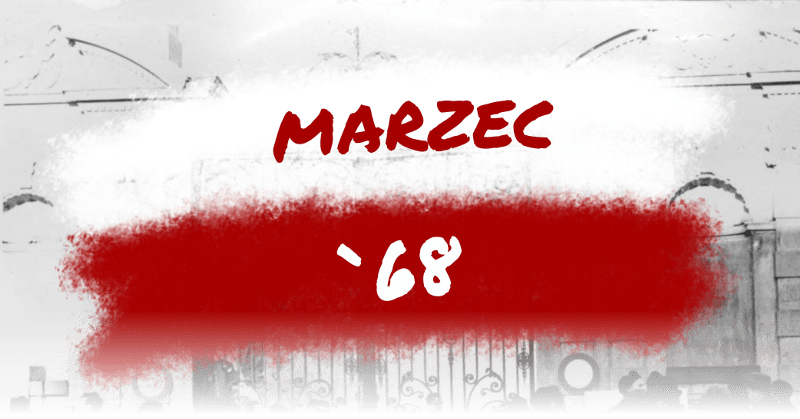March 8, 1968. student strikes began at the University of Warsaw as a reaction to the removal of Adam Mickiewicz's Dziady from the billboard of the National Theatre. They demanded an end to repressions, sympathized with writers, and demanded that the Constitution of the Polish People's Republic be respected. Workers' activists, militia and ORMO pacified students on Krakowskie Przedmieście and in the courtyard of the University of Warsaw. Forty-five people were arrested, including Karol Modzelewski, Jacek Kuroń, Irena Lasota.
The staging of the allusively written "Dziady" captivated the audience. - From a certain point in the performance every word was met with applause. It was an insolent reaction to violence," said Gustav Holoubek, who played Konrad-Gustaw.
The fight for freedom of speech, art, and civil rights was the driving force of the youth of the time. They were fed up with living in a country of fear and censorship and manipulation. Although they had much to lose, students stood up to the PZPR usurpation. "The repression of students who protested against the shameful decision banning the exhibition of Dziady in the National Theatre is a clear violation of Article 71 of the Constitution. We will not allow ourselves to be denied the right to defend the democratic and independence traditions of the Polish Nation. We will not remain silent in the face of repression. resolution adopted on 8 March 1968.
One of the first cities where young people organized solidarity actions in support of Warsaw students was Przemyśl.
On the notice board in the Mechanical and Electrical Technical School in Przemysl, on 12 March at about 10 a.m., a card with the following content was posted: "Attention: on 12 March 1968 at 5 p.m. a rally in solidarity with students fighting in Warsaw is being organized. We ask the students of Przemyśl to take part in it in front of the Mickiewicz Monument.
Indeed, around 5.50 p.m. a group of young people, mainly students of the Juliusz Słowacki Secondary School, came to the monument and demonstratively destroyed 10 copies of the Soviet newspaper Komsomolskaya Pravda, which they had bought especially for this purpose, tearing them into pieces and burning them. The SB report on this demonstration (which was not written until July) informs that at around 7.30 pm a group of about 30 students arrived at the monument with a torch. The students were to shout "Long live Mickiewicz", "Long live Warsaw students" and "Long live Dziady". Then, according to the SB report, the youth sang the national anthem and went home. The next day SB officers removed inscriptions and chalk drawings made by Zenon Zegar on the base of the monument and on the walls of nearby buildings. The slogan "To the Muscovites" appeared on the monument itself, while caricatures of Mieczysław Moczar and the slogans "Down with Moczar" and "To the gallows with Moczar" were displayed in other places.source: Bogusław Kleszczyński, IPN Rzeszów).
At that time, the youth of Przemyśl did not accept this strange world:
aggressive and gloomy. A rebellion was growing in it, so that at the moment of information about strikes in Warsaw it turned into action. The late Wojtek Błachowicz together with Zenon Zegarski unscrewed the Soviet star from the monument to the Bolsheviks killed by the Germans. The secret police did not manage to track them down.
The youngest organizer of the March '68 strikes was Andrzej Mazur from Przemyśl. In his dossier of people being worked on by the Security Service one can see: "On 11.3.1968 [Andrzej Mazur], being in the Feniks club at the Youth House of Culture in Przemyśl, proposed to organize a rally in solidarity with student youth. Then, on March 12, 1968, he took an active part in an attempt to organize a rally at the monument of A. Mickiewicz in Przemyśl".
Today, Andrzej Mazur recalls:
Another anniversary of March 1968. In my opinion, the commune fell right then, not in August 1980 during the Solidarity period.
In March 1968, the youth negated the leadership role of the Party, so the commune had no extension in the next generation! The socialism of the Polish United Workers' Party had lost.
I also never believed the tale of "boors" and "Jews," Natolin and Pulawy. It was, after all, a united party. The protesting youth negated the party as a whole, not caring about its more or less real or tactical factions. It had no idea about them, after all.
And this is still the drama of the orphans of communism. They can't believe they were communists and lost. Whether they pretended to be more "democrats" or more zamordists. They lost civilizationally.
Today, as then in 1968, I'm listening to Eric Clapton!
6 March 2018. The Polish Sejm passed a resolution on commemorating the 50th anniversary of the student demonstrations in March 1968 March '68
Text Marta Olejnik
Logo of the commemoration of March '68 in Przemysl



